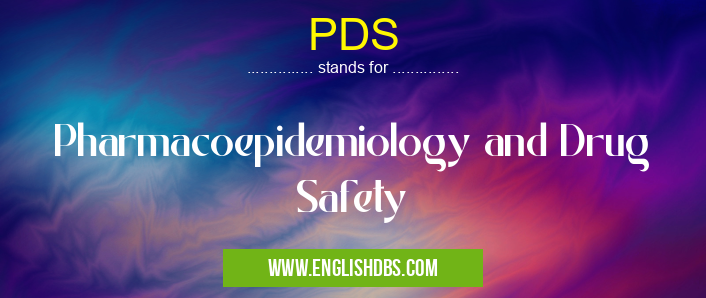What does PDS mean in DRUGS
Pharmacoepidemiology and Drug Safety (PDS) is a specialized field of study that combines principles from epidemiology, pharmacology, and clinical research to evaluate the safety and effectiveness of medications. It plays a crucial role in ensuring the rational use of drugs and protecting public health.

PDS meaning in Drugs in Medical
PDS mostly used in an acronym Drugs in Category Medical that means Pharmacoepidemiology and Drug Safety
Shorthand: PDS,
Full Form: Pharmacoepidemiology and Drug Safety
For more information of "Pharmacoepidemiology and Drug Safety", see the section below.
What does PDS Stand for?
PDS stands for Pharmacoepidemiology and Drug Safety.
Meaning of PDS
PDS encompasses the following key aspects:
- Pharmacoepidemiology: The study of the use, effects, and patterns of medication use in large populations, including the identification of adverse drug events (ADEs).
- Drug Safety: The evaluation of the safety profile of medications, including the assessment of ADEs, risk factors, and causality.
PDS professionals work to identify and mitigate potential drug-related risks, monitor the effectiveness of medications, and provide evidence-based recommendations for their safe and appropriate use.
Conclusion
PDS is an essential discipline that contributes significantly to improving medication safety and public health. By combining epidemiological methods with pharmacological knowledge, PDS provides valuable insights into the benefits and risks of medications, enabling healthcare professionals to make informed prescribing decisions.
Essential Questions and Answers on Pharmacoepidemiology and Drug Safety in "MEDICAL»DRUGS"
What is Pharmacoepidemiology and Drug Safety (PDS)?
Pharmacoepidemiology and Drug Safety (PDS) is a branch of medicine that studies the use and effects of drugs in large populations. It involves assessing the safety and effectiveness of drugs, monitoring drug-related adverse events, and identifying factors that influence drug use and outcomes.
Why is Pharmacoepidemiology and Drug Safety important?
PDS is crucial for ensuring the safe and effective use of drugs. It helps to:
- Identify and prevent adverse drug reactions
- Monitor the long-term effects of drug use
- Evaluate the effectiveness of new and existing drugs
- Inform regulatory decisions about drug approvals and use
What are the key methods used in PDS?
PDS utilizes a range of methods to collect and analyze data on drug use and outcomes, including:
- Observational studies (e.g., cohort studies, case-control studies)
- Randomized controlled trials
- Meta-analyses
- Pharmacovigilance (monitoring of adverse drug reactions)
Who conducts Pharmacoepidemiology and Drug Safety studies?
PDS studies are conducted by research teams that include:
- Pharmacoepidemiologists (researchers specializing in drug use and safety)
- Clinicians (e.g., physicians, pharmacists)
- Statisticians
- Data scientists
How can I access Pharmacoepidemiology and Drug Safety information?
PDS information is available from various sources, including:
- Scientific journals and databases (e.g., PubMed, EMBASE)
- Regulatory agencies (e.g., FDA, EMA)
- Drug manufacturers
- Patient advocacy groups
PDS also stands for: |
|
| All stands for PDS |
